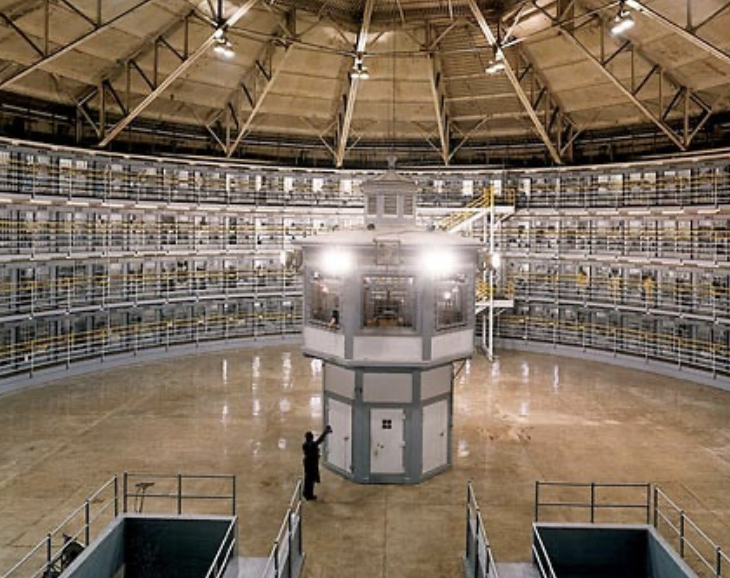
I recently read an excerpt from Michel Foucault’s “Panopticism” in the class “Perspectives on Gender” with Professor Marcus, and upon finishing Part 2 of Go Tell It on the Mountain, I could not help but be reminded of Foucault’s work, specifically the parallels between what he names as “The Panopticon” and the role of religion in the lives of John and his family members. Foucault defines The Panopticon in the context of the carceral system, inspired Jeremy Bentham’s idea for prison reform where the cells circle around a central guard tower, The Panopticon (like the image above). Because they each face inward towards the tower, The Panopticon represents the constant possibility of surveillance, so much so that there not even need be a person inside as long as the people in the prison have internalized this belief (fear) that they are constantly being watched. There is no escape from this incessant monitoring, real or imagined, and risk of punishment that follows should they be caught doing the “wrong” thing. Given the seemingly narrow scope of The Panopticon in Foucault’s writing, I asked: what might The Panopticon look like in other settings?
I think Go Tell It on the Mountain offers one possible answer to this question. I would argue that religion functions as some sort of Panopticon-like force in John’s life. One moment where this idea is especially evident is when John visits the movie theater when “having once decided to enter, he did not look back at the street again for fear that one of the saints might be passing and, seeing him, might cry out his name and lay hand son him to drag him back” (Baldwin 37). John very clearly worries that a member of his church will see him committing this sin and become someone who can testify against him before the Lord come judgment time. In other words, John feels that there is no reprieve from God’s watchful eyes. Another similar example of this idea is when the mass attendees recite “My soul is a witness for my Lord,” and in this instance, John experiences “an awful silence… a dreadful weight, a dreadful speculation… and this weight began to move at the bottom of John’s mind, in a silence like the silence of the void before creation, and he began to feel a terror he had never felt before” (Baldwin 76). I understand John’s visceral reaction to this religious expression to speak to the fear that arises from the exact internalized perception of constant surveillance that is the basis for The Panopticon. For John, by way of others or himself, there is no escaping God’s sight nor this world of binaries– good and evil, white and black– he sees as intrinsically connected to and enforced by his religion.

I really enjoyed the connection you made between the Panopticon and the role of religion in Go Tell it on the Mountain. The first thing I thought of when reading this was the commonly known phrase “God is always watching.” As you mention, like the Panopticon that constantly surveys those imprisoned, God serves as a similar “surveillance”. Although in the context of religion, the belief is that God is always looking into our lives and constantly watching us because he loves us, I think that like the Panopticon there is this internalized fear that comes with God always watching. We fear God will see our sins, when we know we are doing something wrong in his eyes we become nervous because he is watching, and so much more. And, I think that all of this is related to guilt. We aren’t aware of God or even the Panopticon watching unless we know we’re doing something we’re not supposed to be doing.
As someone who also recently read Michel Foucault’s “Panopticism”, I truly enjoyed this comparison to Baldwin. I also find that the watchful eye of God was something John felt he could not escape from. The way that He is always searching and looking for sin. I believe that John does not fully comprehend that God is not looking for people who sin to no longer allow them into Heaven. Yet, as someone who did not grow up in a Southern Baptist Church, I guess I do not have the full understanding of what their teachings are. Yet, the Panopticon is a great comparison to how John is likely feeling!